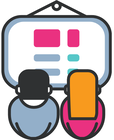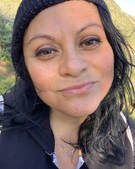
- Does something here validate an experience you are having?
- Does something here point in a direction you would like to go?
- Does something here change how you think about what is possible?
In solidarity,
Emily Marsh
Please scroll down to read our Unconditional Education blog posts.
You can click the button below to learn more about our Unconditional Education and School Based Services!
|
There is a standard opener in most settings I find myself in these days, a variation of “things are so hard right now!” With the current convergence of social, political and physical upheaval, folks are tired. We search each other’s Zoom faces for connection, validation, engagement. We drop encouraging comments in the chat box or click an icon to indicate we love what we heard. Maybe someone asks the check-in question “what’s something good in your life right now?” and we search our memories for a meaningful answer. For some it is more time with a partner, for others a walk outside after work. Almost every casual conversation I have with coworkers and friends these days ends with an exchange of favorite podcasts and TV shows. We are desperate for a way to fill our free time and trying hard to come up with ways to help each other do that too. In these unprecedented circumstances of whatever week we are in, we are looking for something to help us feel good. Recently Julie Kim brought a resource to our clinical supervisor team, an infographic from the Genesis Healing Institute that opened my eyes to another way to consider how we navigate this year. The concept is Transformative Healing, and the ideas presented on this graphic filled me with a new sense of hope and courage. At best, this offers a roadmap that helps guide us through the stages of reckoning and healing that this unprecedented time presents to us. At it is simplest, it is a beautiful collection of affirmations that capture so much of what many of us are feeling and exploring right now. I share the graphic with you here and invite you to consider: 
It might be helpful to think of this as ‘less as a roadmap, more like a cycle,’ such as the stages of grief. We may go through these stages in and out of order each time we are presented with a new 2020 challenge. My hope is that you find this thought-provoking and that it offers you a new way to consider how you can survive (and thrive!?) during this unprecedented time.
In solidarity, Emily Marsh
0 Comments
 This week, we take the opportunity to highlight our long standing partnership with Cox Academy, a school dedicated to “empowering every student to go out and change the world!”  Cox Academy is in the Elmhurst neighborhood of East Oakland and serves grades Pre-K - 5th grade by providing rigorous instruction along with critical thinking and problem-solving skills to set the foundation for success in higher educational settings. With a heavy focus on the whole child, Cox has strived to develop a robust multi-tiered system of support and interventions to not only engage students, but their family and ecological systems as well. This is where our partnership thrives! Recently, Cox Academy has welcomed their new principal, Omar Currie. Omar joined Cox after a year living abroad in Mexico City, Mexico, and he brings quite a bit of experience teaching and leading in schools from North Carolina, to Washington DC, to the Bay (YAY Area). He is a huge college sports fan, and in his free time he enjoys basketball, reading, and dancing. Omar lives in San Francisco with his partner, Ryan.  Although the world has been forced to shift learning practices and teaching skills online, Team Cox and the entire MTSS Team have collaborated to provide relevant and meaningful ways to do this thing called “Distance Learning.” This impacts so many extraordinary kids, considering special education at Cox is based on a full inclusion model (meaning, students with specific and/or specialized needs spend the majority of their time in general education classroom settings), which ultimately result in secondary benefit in general education classrooms. Through tons of teamwork and collaboration Team Cox has been successful in implemented the following IEP accommodations, which result in supporting the entire classroom: 
 As we enter October, I want to highlight our mental health service delivery model at ASCEND K-8, one of our Education for Change charter partner schools in Oakland, California. Our clinical team at ASCEND is in the exciting process of expanding their reach by providing short term therapy for students that the school has historically struggled to serve. These are students who do not meet the strict eligibility criteria of our two primary funders: MediCal and Special Education (Educationally Related Mental Health Services, also referred to as ERMHS). This shift in service was inspired by the shared vision of Principal Lindzey Tassano and our clinical team who are all committed to increasing equity and accessibility of services for all students and families. When describing the vision for creating this service and the clinical team’s contributions, Principal Tassano shared: This current level of collaboration reflects All-In’s long history with ASCEND, where we have partnered over the last several years to build out a coordinated system of tiered academic, behavioral and social emotional supports. ASCEND was part of a pilot set of schools that integrated the Unconditional Education Coach role, which provided the opportunity to implement clear structures for assessing and improving schoolwide culture and climate year over year. Intentional capacity building efforts have allowed ASCEND to take on the special education, behavioral and culture and climate services in-house, while Seneca continues to partner to provide clinical supports via county mental health and special education contracts. Our current Seneca team consists of three full-time clinicians who strive to provide a broad array of tiered social emotional supports, which, on top of traditional individual and family therapy, includes: regularly contributing to structured collaboration time with teachers, participating on the Multi-Tiered System of Supports (MTSS) team, partnering with the administrative team to develop intervention plans, participating in school wide efforts such as Intersession (a week where students have experiential offsite learning), providing Trauma Informed Education training, and supporting ASCEND’s desire to establish a stronger culture around receiving and providing direct feedback.
This level of integration has not always been easy for our staff and has required communication and collaboration with the administrative team around staff capacity and boundaries. As we fine-tune the process for providing short term therapy this level of collaboration will continue, ensuring that Seneca staff have the opportunity to co-construct the process for services delivery with their capacity in mind. Overall, it is great to see our clinical team valued as members of the ASCEND community and we look forward to continuing to evolve in our partnership to provide the most responsive supports for this school community.  Name: Adrianna Delacruz Position: Bilingual Clinical Intervention Specialist What led you to your current position? The desire to work in this field was a direct result of my upbringing and experiences in life. While in foster care, I met so many loving and devoted people who were there to help me; their titles ranged from my foster mom, psychiatrists, social workers, case managers, and therapists. Each one made an overwhelmingly positive impact on my life. The footprints imprinted on my heart instilled an intense admiration and respect for the clinical work in community mental health. What inspires you to do this work? Life was rough growing up, I endured many traumatic experiences at a very young age that led to childhood and adolescence colored by survival and coping. I ended up in the foster care system for a few years and my clinical team paved the way for healing the trauma that was left unaddressed and unhealed from my early days. Over the years, I have experienced the powerful and transformative impacts of therapy, giving me a second chance at life despite early adverse beginnings. My driving purpose of this work is to provide a safe healing space and support my clients and their families through their healing process. What is a recent highlight you’ve experienced in the work or an important lesson you’ve learned in this role? In my journey to becoming a clinical therapist I have grown through my own empathy, resilience and acceptance. Share your life motto: "Every day is a fresh start."  In this week’s post, I’d like to highlight our continued partnership with Alliance Renee & Meyer Luskin Academy. Luskin Academy opened in 2012, and currently serves 488 students for grades 9th – 12th in Los Angeles’ Hyde Park neighborhood. It is one of 25 middle and high schools that make up Alliance College-Ready Public Schools, a network of Los Angeles charter schools serving communities that have historically faced systemic oppression, marginalization, and—as a result—were underperforming schools. Seneca began this partnership with Luskin last school year after Alliance came to tour our Bay Area programs in early 2019. Alliance’s home office team connected us to Luskin’s principal, who had led his previous school to implement a full inclusion special education model—and it became quickly apparent how aligned his vision was to the goals of the UE model. Toward this end, Luskin had recently “staffed up” a robust and experienced student support team of deans, counselors, and special education leads, and our central partnership goal was to figure out the best ways to coordinate and collaborate efforts across these teams. Through the support of grants from Los Angeles Unified School District, our own Geoff Nuñez is now serving his second year at Luskin as a Behavior Interventions Coach. After supporting multiple Alliance schools last year, we were lucky to establish Geoff full-time at Luskin this school year. His expanded role now includes:
This is one of the first and most common questions I receive as an occupational therapist. Generally speaking, occupational therapy is a healthcare service which helps people participate functionally in the occupations or activities that are necessary or meaningful to their life. Depending on the setting or the client, those meaningful occupations can vary. For children and adolescents, one of their primary occupations is being a student. School based occupational therapy
What skills or areas can OTs help with?How does that work in distance learning? Occupational therapists adapt activities and create modifications to provide a “just right challenge” for students. This allows the student to feel successful in their schoolwork and activities while simultaneously continuing to build their skillsets. In distance learning, we continue to do just that! Instead of using sensory tools at school to self-regulate, we are building a “tool-box” of sensory items at home (i.e. blankets, squishy balls, play doh, etc.). Instead of practicing copying sentences from a real whiteboard, we are practicing copying sentences from a virtual “Zoom whiteboard.” And instead of promoting socio-emotional skills through peer interactions on the playground, we are playing turn-taking virtual games and role playing how to react and respond to what a peer said over a Zoom. For me, this has been one of the more fun challenges of virtual occupational therapy, finding games that translate easily to Zoom like Tic-Tac-Toe, Connect Four, or “Snakes.” True, the environment and resources have changed, but the service goal is the same: to help students access their curriculum in spite of any obstacles they face, including and not limited to, a pandemic. Since the start of March our lives have changed dramatically. We’ve shifted our daily routines, the ways in which we interact and connect with others, and how we are able to nourish and sustain our own wellbeing. Many in our communities have lost loved ones, confronted illness, juggled work and family responsibilities, and mustered the resources to make ends meet. Schools, which often serve as a central hub for family support, made an overnight transition to virtual learning. They have had to identify new systems and routines for instruction, connection, and resource delivery all while school personnel negotiate the impact of the changing world in their own lives. Further, the impact of this pandemic and the concurrent national conversation on police violence against the Black community has highlighted the ways in which deep systemic inequities reach across our institutional systems, from health care to criminal justice to education. What is clear is that grand changes are needed in both the short and long term to build more equitable systems. Through all of these changes what has remained steadfast is our commitment to building systems of education that are strong and inclusive, even in the face of tremendous adversity. Grounded in Seneca’s longstanding mission of connecting with individuals and families during difficult times, we have taken what we know about responding to periods of crisis and applied these same principles to support schools in adapting their practices to the virtual context. We are thrilled to release this piece Implementing Unconditional Education in a Virtual Setting where we have captured what we have learned by working with over 40 schools and districts through this transition to remote learning. This piece is intended to act as a companion to Unconditional Education: Supporting Schools to Serve All Students articulating the adaptations required in the implementation of this framework for a blended or remote learning setting. It aims to highlight how during periods of struggle we can find grounding in the formative beliefs and values that drive our work - our belief in the power of relationship, the collective capacity of teams, and our ability to reach a shared vision when we’ve identified clear goals. In addition, it provides practical considerations for the modification of essential coordination and assessment procedures that drive a multi-tiered system of care. Our hope is to share lessons learned with others who are building systems to support all students, and the adults in their lives, in finding wellness and hope in this challenging time. |
Authors:School Program Partnerships We're Hiring!Interested in joining our School Program Partnerships' Team? Check out our open positions below!
Categories:
All
Archives
May 2024
|